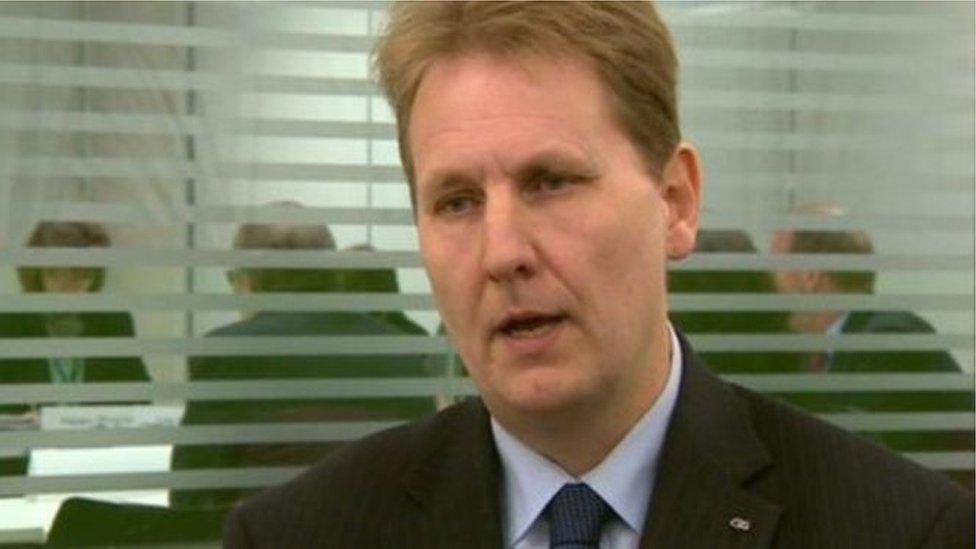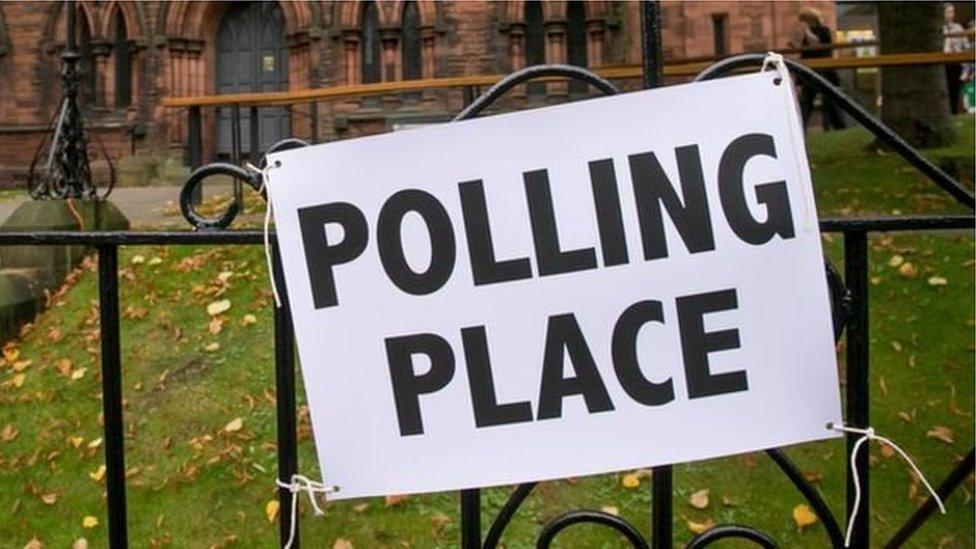Police commissioners: a choice of party hats or indies
- Published
Party-time or independence day?

Conservative candidate to be re-elected as Staffordshire PCC, Matthew Ellis, won on an overall turnout of 11.6% in 2012 - the lowest anywhere in England
Anyone who wanted to demonstrate a triumph of apathy over democracy couldn't have done much better than to hold an election in the middle of November for a role which most people knew next-to-nothing about and cared even less.
And to no-one's great surprise, that's exactly what happened in 2012's elections for the new police and crime commissioners. There are five of them in our part of the country, one for each of our police force areas. Gloucestershire's turnout of just 16% was the highest here. Staffordshire's 11.6% was the lowest anywhere in England. This reinforced the irony that an innovation trumpeted by ministers as an exercise in high-profile accountability, replacing the "invisible" police authorities, had left six in every seven voters completely unmoved.
Critics of the established parties told us this was further evidence of how they had lost touch with most of the people they represented. So too were the successful independent candidates who confounded the conventional wisdom that it was all but impossible to beat the party organisations at their own game. Three of our five Midlands commissioners are independents.
That was then, this is now

The first Thursday in May looks a much better bet for a less embarrassing turnout; it's when people expect elections
There is no question that the commissioners have become significantly more visible during the four years leading up to the next elections. And the first Thursday in May looks a much better bet for a less embarrassing turnout; it's when people expect elections, longer daylight and (we hope) rising temperatures, might also help to thaw that anti-democratic chill.
Other intriguing talking points to emerge during this first term: Have the commissioners succeeded in their primary duty to cut crime? Are the police more efficient, or less, in the face of the cuts to their budgets? How well, or badly, have they worked with the police officers, given that they are not allowed to interfere in individual operations? Do we still need two separate commissioners for the West Mercia and Warwickshire areas when the "strategic partnership" between the two forces appears more and more like their own version of ever-closer union.
The role of the commissioner has also become drawn into the wider political debate about the government's self-professed devolution revolution. With the West Midlands Combined Authority just six weeks away from coming to life, the police commissioner in the West Midlands force area is increasingly touted as a possible interim 'metro mayor' for the 12 months leading up to the mayoral elections. I have also heard the suggestion that policing could itself eventually be added to the growing list of the combined authority's responsibilities.
Who's next?
GLOUCESTERSHIRE
The former police superintendent Martin Surl was one of the independent candidates who defied the experts last time by beating the Conservatives into second place following the redistribution of second preference votes. The main challenge to his re-election campaign comes from the Conservatives, who are confident local elections in three districts of a Tory-dominated county will help to drive up their share of the vote. No candidates are being fielded by UKIP, the Greens or the Liberal Democrats.
Candidates:
Barry Kirby (Labour)
Martin Surl (Independent)
Will Windsor-Clive (Conservative)
STAFFORDSHIRE
Few of the first wave of police commissioners have a higher public profile than the Conservative Matthew Ellis. In a county usually dominated by the two biggest parties, Labour are expected to provide the stiffest opposition to his re-election. Their candidate is also well-known locally as the leader of Cannock Chase Council. The Liberal Democrats are alone among the other main parties in not fielding a candidate here.
Candidates:
George Adamson (Labour)
Natalie Devaney (Independent)
Matthew Ellis (Conservative)
Harold David Gregory (UKIP)
Paul Edward Woodhead (Green Party)
WARWICKSHIRE
Ron Ball left his job as a British Airways pilot to mount his successful Independent campaign. He is not seeking re-election this time, which could improve the chances of the Conservative candidate, the husband of the county's Tory council leader. There are two Independent candidates, of whom Ben Twomey, at 22, is England's youngest would-be PCC.
Candidates:
Nicola Davies (Liberal Democrat)
Rob Harris (UKIP)
Julie Jackson (Labour)
Philip Seccombe (Conservative)
Ben Twomey (Independent)
David Whitehouse (Independent)
WEST MERCIA
Another former police superintendent narrowly topped the poll last time, but unlike Martin Surl, West Mercia's Independent commissioner Bill Longmore is not standing again. His deputy Barrie Sheldon is hoping to keep an Independent flag flying here. It will be a hotly-contested affair because all the main parties are fielding candidates in the force that covers Herefordshire, Worcestershire and Shropshire.
Candidates:
John-Paul Campion (Conservative)
Peter Jewell (UKIP)
John Raine (Green)
Margaret Rowley (Liberal Democrat)
Barrie Sheldon (Independent)
Daniel Walton (Labour)
WEST MIDLANDS
The former transport minister David Jamieson was elected two years ago after the death of the previous Labour commissioner Bob Jones; Mr Jamieson is Labour's candidate once again. He is a strong favourite in a field of four which includes the former Conservative leader of Dudley Council Les Jones. The contest in one of Britain's biggest police forces is another in which the Liberal Democrats are conspicuous by their absence.
Candidates
Pete Durnell (UKIP)
Andy Flynn (Independent)
David Jamieson (Labour)
Les Jones (Conservative)
This weekend's Sunday Politics Midlands will have more on a series of contests which would not be happening at all if Labour had won the general election. Their police spokesman, the Birmingham Erdington MP Jack Dromey, told me repeatedly why an incoming Miliband government would scrap the role altogether.
Now that this second set of elections is happening on schedule, it look more likely than ever the the police and crime commissioners are here to stay.
Join me live at 11:05 BST for Sunday Politics Midlands on BBC One this Sunday 1 May 2016.